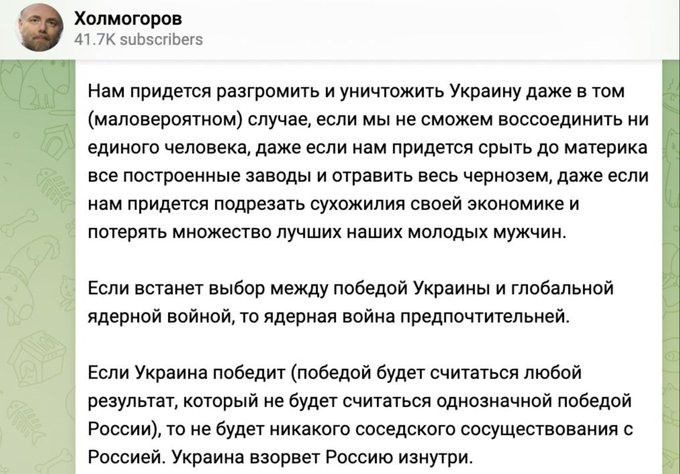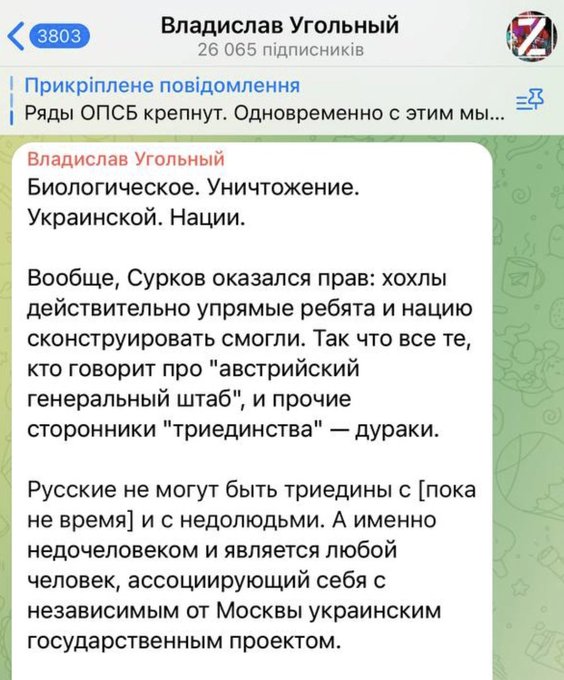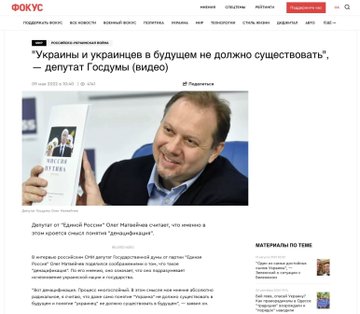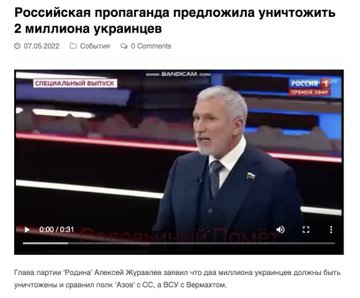Tag: India
Empty annexations won’t make an empire
I’ve been out of commission for ten days or so. Peacefare was also down for a few days. But both of us are back now and trying to catch up.
The big news is clear: Russia is losing the war in Ukraine. Kyiv has forced Moscow’s retreat both in the northeast and to a lesser extent in the south. Russia’s hold on remaining occupied territory is precarious, though stronger in the south than in the the northeast. The Wagner group, a supposedly private security force reporting directly to the Kremlin, has proven much more reliable there than the regular Russian army and even than the Donbas proxies elsewhere.
Doubling down
Putin’s reaction is to double down. He has ordered a partial mobilization that has driven tens of thousands of Russians out of their country. He has also signed a piece of paper claiming to annex four Ukrainian provinces, though Russian forces control only a portion of them. The annexation is nominally a response to fake referenda conducted among the way fewer than 50% of the population of those provinces actually under Russian control. Russian troops carried the ballot boxes door to door and asked people to vote at gunpoint. Moscow claims to have annexed largely empty territory it is incapable of repopulating.
Ukraine has doubled down as well. Its army continues to perform far beyond expectations. Newly armed and amply inspired, it is taking territory at a fast pace. Kyiv has also submitted an application for NATO membership. That is unlikely to be approved before Russia is driven completely from Ukrainian territory, including Crimea. Even then there will be opposition inside the Alliance. But it signals the realignment that Putin has incentivized. It would be hard to convince any Ukrainian loyal to Ukraine that NATO membership is not in Ukraine’s interest. Even if Ukraine never accedes, it will be aligned with NATO in the future.
Shrinking war aims
Despite doubling down, Moscow has shrunk its war aims. Putin has abandoned for now his original objective, the conquest of Kyiv and the absorption of all of Ukraine into an extended Russian empire. He won’t be able to absorb all of Luhansk, Donetsk, Zaporizhzhia, and Kherson either:

The parts of Luhansk and Donetsk that were under Moscow’s control from 2014 until this year did not fare well under Russian rule. Any territory that remains under Russian control when a ceasefire some day takes effect will be depopulated and depressed. Even if Putin wins, those whom he governs will lose.
More modest but sustainable ambition is needed
Putin conceives of himself as engaged in a global struggle against a perverse, exploitative, and violent West. He is losing that struggle not only on the battlefield in Ukraine but also throughout Europe and in the democratic Far East. Even India and China are distancing themselves. His confidence in the 1000-year Russian state is grossly overwrought. Russia is a second-rate petro power with nuclear weapons he knows it can’t use without precipitating a catastrophic response. It is time for Russians to wake up and do what they know needs doing: get rid of him and his coterie and return Russia to a more modest but sustainable ambition.
No, it’s not ending until Zelensky says so
Ukraine has won back substantial territory in Kharkiv province in the past 10 days or so. They snookered the Russians into thinking the offensive would come in the south. Moscow moved many of its best troops there, leaving the northeast ill defended. And in recent days both China President Xi and India’s Prime Minister Modi have scolded Russian President Putin, suggesting he should sue for peace. This has made some wonder if the end of the war is near.
Location, location, location
The short answer is no. Russia still has vast resources of men and materiel to throw at the Ukrainians. Putin might like a ceasefire to give himself some time and space to resupply. But that is a far cry from readiness to negotiate a serious settlement. Nor are the Ukrainians interested in allowing the Russians to stay on their territory. President Zelensky has made it clear he is fighting for 100% of his 2014 pre-invasion sovereign territory. He will come under pressure from the Europeans and Americans to accept a ceasefire if Russia is rolled back to the lines of February 23.
Identity, identity, identity
I doubt even then Zelensky will be tempted to stop if his forces are still moving in the right directions. The war has vastly increased his own popularity, from a nadir a year or two after his election. He would be risking disappointment on the home front if he stopped the war before regaining as much territory as possible.
Ukrainians have gained a far stronger sense of national identity than appeared to exist before the war. This is what happens when you kill people because of their identity. It reinforces that identity among those who remain alive. Ukrainians know that the discourse in Russia is genocidal.
How would you feel if you were Ukrainian?
Stéphane Siohan tweets some compelling examples:
#Ukraine I am not sure that Europe and the world understand the nature of the genocidal discourse about Ukraine circulating in the Russian information space. Read the following excerpts. — THREAD (1)
Telegram channel of the journalist Ehor Holmogorov: “We will have to crush & destroy #Ukraine even if we have to tear down all their factories and poison all the black soil, even if we have to cut the tendons of our economy and lose many of the best our young men.” (2)

Journalist Ehor Holmogorov: “If the choice is between a Ukrainian victory and a global nuclear war, then a nuclear war is preferable. If Ukraine wins , then there will be no neighborly coexistence with Russia. Ukraine will blow up Russia from within (3)
Vladislav Ugolnyi, Russian publicist: “Biological destruction of the Ukrainian nation. Russians cannot be live in unity with subhumans. Namely, any person who associates himself with a Ukrainian project independent of Moscow is a subhuman.” (4)

Russian Duman MP Oleh Matveychev: “Ukraine and Ukrainians should not exist in the future.” The head of Russian party “Motherland”, Alexei Zhuravlev, proposes to “destroy two million Ukrainians”.


A hard winter of cold and deprivation could temper Ukrainians’ enthusiasm for continuing the war. But until it does the Russians have little hope of convincing Ukrainians that they would be better off negotiating than continuing the fight.
Russia thinks it has better odds with the Europeans
The Russians think some in the European Union are likely to cry uncle before the Ukrainians do. But the situation there isn’t as bad as it might appear. Those whom Russia most directly threatens will remain stalwart. Estonia, Latvia, Lithuania, and Poland know that they are next if Putin succeeds in Ukraine. Sweden and Finland have abandoned neutrality and stand with NATO. Germany is vulnerable because of its reliance on Russian gas, but Berlin appears to have made progress in avoiding a catastrophe when Moscow cuts it off during the winter. France depends far less on Russian gas but President Macron fancies himself a skilled mediator. He isn’t likely to succeed in that role. Gas prices have hit the UK economy hard, but it has been a strong and constant supporter of Ukraine.
Are the Americans soft?
President Biden has so far been rock solid in backing Ukraine with money, arms, and diplomatic support. There are however on both right and left in the US Congress some who are less committed and even a few who implicitly back Russia. That perspective has had little traction with the American people. But it is possible, if the economy dips into recession, that doubts will grow. There is also a portion of the American foreign policy establishment that worries about the impact on Russia of a defeat. Some prefer the devil they know, especially if he has nuclear weapons.
But Biden sees Ukraine as a main theater of conflict with autocracy. Were the Ukrainians to lose, or settle for an agreement that leaves Russian troops on their soil and ready to make war again in the future, it would look as if autocracy had won. He is unlikely to yield until compelled.
Stevenson’s army, September 2
– Defense contractor lobbyists want boost for inflation.
– Appropriators plan stopgap until December.
– Axios says India has gone from buying 1% of Russian oil to 13%.
– State criticizes Iran’s response on nuclear deal.
– 50 in House also hit Iran deal.
My SAIS colleague Charlie Stevenson distributes this almost daily news digest of foreign/defense/national security policy to “Stevenson’s army” via Googlegroups. I republish here. To get Stevenson’s army by email, send a blank email (no subject or text in the body) to stevensons-army+subscribe@googlegroups.com. You’ll get an email confirming your join request. Click “Join This Group” and follow the instructions to join. Once you have joined, you can adjust your email delivery preferences (if you want every email or a digest of the emails).
Stevenson’s army, June 22
– NYT says China and India are buying a lot of discounted Russian oil, thus undercutting the effect of sanctions.
– Stars & Stripes has background on US forces in Lithuania.
– Biden restores landmine ban.
– GAO deplores aircraft readiness rates despite big budget boosts.
– Mitre has good study on competing with China in defense systems.
– RollCall catches GOP members who oppose earmarks but have asked for them.
My SAIS colleague Charlie Stevenson distributes this almost daily news digest of foreign/defense/national security policy to “Stevenson’s army” via Googlegroups. I republish here. To get Stevenson’s army by email, send a blank email (no subject or text in the body) to stevensons-army+subscribe@googlegroups.com. You’ll get an email confirming your join request. Click “Join This Group” and follow the instructions to join. Once you have joined, you can adjust your email delivery preferences (if you want every email or a digest of the emails).
Iran is already at the nuclear threshold
This video is more than a year old:
Iran, which is now enriching uranium to at least 60%, is already a nuclear threshold state. There are no difficult technical obstacles that remain before enriching to weapons-grade material. Moving beyond that to fabricating a nuclear device is more difficult, but certainly not beyond Iranian capability. The question is: what difference does this make? The answer to that question depends on who you are. Israel, other regional states, the European Union, and the United States have distinct answers.
Israel apparently doesn’t care
Iran is significantly closer to nuclear weapons than when President Trump withdrew from the nuclear deal (aka Joint Comprehensive Plan of Action, or JCPOA). This is in part because Israel urged the US to back out of the JCPOA and has done its best to prevent the US from re-entering it. The Israelis have preferred their own approach, which involves assassinations and attacks on nuclear infrastructure. But given the outcome so far, it appears they don’t care how much weapons-grade uranium the Iranians accumulate.
Why are the Israelis behaving this way? Is it because they are supremely confident of their ability to prevent weaponization of enriched uranium? Is it because their second-strike capability (from submarines) is thought to be a sufficient deterrent to an Iranian nuclear attack? Or is it because the Israelis believe American guarantees that Iran will never get nuclear weapons?
Whatever the reason, it is clear that Israel doesn’t really care about Iran accumulating weapons-grade uranium.
The region does, but what are they doing about it?
Major states in the region do care. Both Turkish President Erdogan and Saudi Crown Prince Mohammed bin Salman have said, more or less explicitly, that they will not be left wanting if Iran gets nuclear weapons. This is not how they have reacted to Israeli nuclear weapons, about which they complain readily but apparently do little. Neither country has used the decades since Israel became a nuclear power to mount serious nuclear weapons programs of their own, so far as is known. Instead, they have pleaded for a regional nuclear-free zone, which they know the Israelis won’t agree to.
Their reaction to Iran is rhetorically different. Riyadh and Ankara appear to see Iranian nuclear weapons as a threat to the regional power balance, one they need to counter. There are however still big questions about intentions and capability. Were Erdogan and MBS serious, or just rhetorical? Turkey has American nuclear weapons on its territory. Would Ankara risk losing those if it decides to go nuclear on its own? Does Turkey have the nuclear and high-explosive expertise required to enrich uranium or extract plutonium, as well as design a working nuclear weapon? Does Saudi Arabia? Has either obtained the needed materials, technology, and even weapons from Pakistan?
Egypt has been more circumspect than Turkey and Saudi Arabia. It has lived with Israeli nuclear weapons on its border for decades, apparently confident they won’t be used against a neighbor who has made peace, even if a cold one. American influence in Cairo is far greater than in Riyadh and Ankara, which is likely another factor in Egyptian reluctance to move in the direction of nuclear weapons.
Europe cares, but not in the same way as the United States and Russia
The European Union has exhausted itself in nuclear negotiations with Iran. This is not because of any threat to Europe from Iranian nuclear weapons. Most European states would like to normalize relations with Tehran. The unresolved nuclear issue makes that impossible. Hence the diplomatic efforts, first to negotiate the 2015 JCPOA and, after Trump left office, to revive it.
For the United States and Russia, the concern is nuclear proliferation, or to put it another way maintenance of their exclusive status as global nuclear powers. Both were unhappy with India and Pakistan getting nuclear weapons, but neither Delhi nor Islamabad has challenged the five permanent members of the UN Security Council (the Perm 5), all of which are nuclear states. Instead they have accepted the subcontinent nuclear balance and avoided nuclear contests beyond South Asia. This is true even though India views its nuclear weapons as necessary to balance China more than Pakistan. But nuclear balance has not been a factor in outstanding border disputes between New Delhi and Beijing.
The Middle East is not South Asia
It is harder to picture easy adjustment to Iranian nuclear weapons in the Middle East, especially if the Turks and Saudis follow suit. In a Middle East with four nuclear powers, or even five if Egypt joins the party and six if you count Pakistan, a stable balance will be far more difficult to achieve than between two parties like Pakistan and India. A nuclear arms race in a region with few stabilizing institutions and lots of destabilizing conflicts will be extraordinarily difficult to contain.
Stevenson’s army, June 7
– Swedish govt survived a no confidence vote after deal with Kurdish MP.
– WSJ has more on Erdogan.
– AMLO won’t attend this week’s summit.
– India may be part of the Quad, but Walter Russell Mead notes the many differences with US
– NYT notes troubles Ukrainians have learning new weapons.
– US is bombing al-Shabaab again. When the class talks abut Congress, I’ll want you to devise a new AUMF to handle this situation.
My SAIS colleague Charlie Stevenson distributes this almost daily news digest of foreign/defense/national security policy to “Stevenson’s army” via Googlegroups. I republish here. To get Stevenson’s army by email, send a blank email (no subject or text in the body) to stevensons-army+subscribe@googlegroups.com. You’ll get an email confirming your join request. Click “Join This Group” and follow the instructions to join. Once you have joined, you can adjust your email delivery preferences (if you want every email or a digest of the emails).




 RSS - Posts
RSS - Posts
